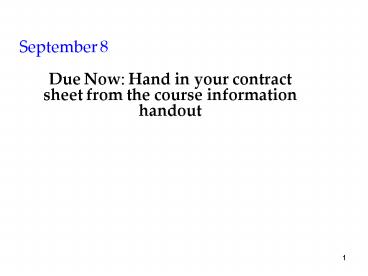September 8 - PowerPoint PPT Presentation
1 / 31
Title:
September 8
Description:
Psychology- the scientific study of behavior and mental processes ... Psychodynamic. 24. Psychology's Current Perspectives. Sample Questions. Focus. Perspective ... – PowerPoint PPT presentation
Number of Views:157
Avg rating:3.0/5.0
Title: September 8
1
September 8
- Due Now Hand in your contract sheet from the
course information handout
2
What do you know about
psychology?
- Fact or falsehood? Handout. Determine whether
these common beliefs are true!
3
What is psychology?
- Psychology- the scientific study of behavior and
mental processes - Behavior- observable objective actions
- Mental processes- Unobservable subjective actions
4
The History and Scope of Psychology
5
The History and Scope of Psychology
- Psychologys Roots
- Prescientific Psychology
- Psychological Science is Born
- Psychological Science Develops
- Contemporary Psychology
- Psychologys Big Debate
- Psychologys Three Main Levels of Analysis
- Psychologys Subfields
6
Psychologys Roots
- Prescientific Psychology
Ancient civilizations deemed mental illnesses to
be a because of possessive evil spirits
In India, the Buddha pondered how sensations and
perceptions combined to form ideas.
In China, Confucius stressed the power of ideas
and of an educated mind.
Confucius (551-479 BCE)
7
Prescientific Psychology
- Socrates (469-399 BCE) and Plato (428-348 BCE)
http//www.law.umkc.edu
http//www.law.umkc.edu
Socrates
Plato
Socrates and his student Plato believed that the
mind was separate from the body, that it
continued to exist after death, and that ideas
were innate.
8
Prescientific Psychology
- Aristotle (384-322 BCE)
http//faculty.washington.edu
Aristotle suggested that the soul is not
separable from the body and that knowledge
(ideas) grow from experience.
9
Prescientific Psychology
- Rene Descartes (1596-1650)
http//www.spacerad.com
http//ocw.mit.edu
Descartes, like Plato, believed in soul (mind)
body separation but speculated on how the
immaterial mind and the physical body
communicated.
10
Prescientific Psychology
- Francis Bacon (1561-1626)
http//www.iep.utm.edu
Bacon was one of the founders of modern science,
especially the experimental method.
11
Prescientific Psychology
- John Locke (1632-1704)
biografieonline.it/img/bio/John_Locke.jpg
Locke held that the mind is a tabula rasa or
blank sheet at birth and experience writes on it.
12
Prescientific Psychology
- How are ideas formed?
13
Psychological Science is Born
- Structuralism
Titchner (1867-1927)
Wundt (1832-1920)
Wundt and Titchner studied the elements (atoms)
of the mind by conducting experiments at Leipzig,
Germany in 1879.
14
Psychological Science is Born
- Functionalism
James (1842-1910)
Influenced by Darwin, William James established
the school of functionalism, opposing
structuralism.
15
Psychological Science is Born
- The Unconscious Mind
Freud (1856-1939)
http//loeillet.chez-alice.fr
Jung (1875-1961)
http//ot.re.kr
Sigmund Freud and his followers emphasized the
importance of the unconscious mind and its
effects on human behavior.
16
Psychological Science Develops
- Behaviorism
Skinner (1904-1990)
Watson (1878-1958)
Watson (1913) and later Skinner emphasized the
study of overt behavior as the subject matter of
scientific psychology.
17
Psychological Science Develops
- Humanistic Psychology
Maslow (1908-1970)
http//facultyweb.cortland.edu
Rogers (1902-1987)
http//www.carlrogers.dk
Maslow and Rogers emphasized current
environmental influences on our growth potential
and our needs for love and acceptance.
18
Psychology Today
- We define psychology today as the scientific
study of behavior (what we do) and mental
processes (inner thoughts and feelings).
19
Psychological Associations Societies
- American Psychological Association is the largest
organization of psychology with 160,000 members
world-wide, followed by The British Psychological
Society with 34,000 members.
20
Contemporary Psychology
- Psychologys Big Debate
- Nature versus Nurture
Darwin (1809-1882)
Darwin states that nature selects those traits
that best enable the organism to survive and
reproduce in a particular environment.
21
Contemporary Psychology
- Psychologys Three Main Level of Analysis
- Psychological Influences
- learned fears and other learnt expectations
- emotional responses
- cognitive processing and perceptual
interpretations
- Biological influences
- genetic predispositions
- genetic mutations
- natural selection of adaptive physiology and
behaviors - genes responding to environment
Behavior or mental process
- Social-cultural Influences
- presence of others
- cultural, societal, and family expectations
- peer and other group influences
- compelling models (such as media)
22
Psychologys Current Perspectives(pg. 11 in text)
23
Psychologys Current Perspectives
24
Psychologys Current Perspectives
25
Psychologys Subfields
- Research
26
Psychologys Subfields Research
Data APA 1997
27
Psychologys Subfields
- Applied
28
Psychologys Subfields Applied
Data APA 1997
29
Clinical Psychology vs. Psychiatry
- A clinical psychologist (Ph.D.) studies,
assesses, and treats troubled people with
psychotherapy. - Psychiatrists on the other hand are medical
professionals (M.D.) who use treatments like
drugs and psychotherapy to treat psychologically
diseased patients.
30
Close-up
Your Study of Psychology Survey, Question, Read,
Review and Reflect (SQ3R)
- Survey what you are about to read, including
chapter outlines and section heads - Question Ask questions. Make notes.
- Read Make sure you read outlines, sections and
chapters in entirety. - Review Marginal definitions. Study learning
outcomes. - Reflect On what you have learnt. Test yourself
with quizzes.
31
Close-up
Additional Study Hints
- Distribute your time
- In class, listen actively
- Overlearn
- Be a smart test-taker































